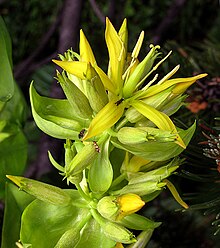Gentius
| |||||||||||||||||||
Read other articles:

В Википедии есть статьи о других людях с такой фамилией, см. Соколова; Соколова, Елена. Елена Соколова Имя при рождении Елена Борисовна Соколова Дата рождения 7 сентября 1972(1972-09-07) (51 год) Место рождения Мирный, Якутская АССР, РСФСР, СССР Гражданство СССР Россия Професси

У Вікіпедії є статті про інших людей із прізвищем Любченко. Любченко Аркадій Панасович Аркадій Любченко у 1928 роціНародився 8 [20] березня 1899(18990320)Старий Животів, Київська губерніяПомер 25 лютого 1945(1945-02-25)Бад-Кіссінген, Третій РайхПоховання Бад-КіссінгенГромадянств

Cricket tournament in New Zealand 1966–67 Plunket ShieldThe Plunket Shield trophyCricket formatFirst-classTournament format(s)Round-robinChampionsCentral Districts (2nd title)Participants6Matches15← 1965–661967–68 → The 1966–67 Plunket Shield season was a tournament of the Plunket Shield, the domestic first-class cricket competition of New Zealand. Central Districts won the championship, finishing at the top of the points table at the end of the round-robin tournament betw...

Swedish actress Fanny WesterdahlFanny Westerdahl by Maria RöhlBornFanny Amalia Westerdahl21 February 1817Stockholm, SwedenDied27 March 1873Stockholm, SwedenOther namesFanny HjortsbergSpouseCarl Edvard Hjortsberg Fanny Amalia Westerdahl or Fanny Hjortsberg (21 February 1817 – 27 March 1873) was a Swedish stage actress,[1][2] active between 1829 and 1862.[2] She is also known to have performed in some opera performances. She belonged to the elite actresses at the...

En este artículo sobre futbolistas se detectaron varios problemas. Por favor, edítalo y/o discute los problemas en la discusión para mejorarlo: Necesita referencias adicionales para su verificación. Las referencias no son claras o tienen un formato incorrecto. Este aviso fue puesto el 21 de junio de 2022. Para futbolista argentino, véase Pedro González Pierella. Para otras personas del mismo nombre, véase Pedro González. Pedro González Datos personalesNombre completo Pedro ...

El texto que sigue es una traducción incompleta. Si quieres colaborar con Wikipedia, busca el artículo original y finaliza esta traducción.Copia y pega el siguiente código en la página de discusión del autor de este artículo: {{subst:Aviso traducción incompleta|Marie Stopes}} ~~~~ Marie Stopes Información personalNombre en inglés Marie Charlotte Carmichael Stopes Nacimiento 15 de octubre de 1880 Edimburgo (Reino Unido de Gran Bretaña e Irlanda) Fallecimiento 2 de octubre de 1958 (7...

Diana Karina Velázquez Ramírez Diputada del Congreso del Estado de Chihuahuapor el distrito 21 30 de septiembre de 2016-31 de agosto de 2018Predecesor Mayra Díaz GuerraSucesor Lorenzo Arturo Parga Amado Diputada del Congreso de la Uniónpor el distrito 9 de Chihuahua 1 de septiembre de 2012-31 de agosto de 2015Predecesor Luis Carlos Campos VillegasSucesor Carlos Hermosillo Arteaga Información personalNacimiento 13 de junio de 1970 (53 años)Hidalgo del Parral, Chihuahua, MéxicoNacio...

У Вікіпедії є статті про інших людей із прізвищем Носенко. Юрій Іванович Носенкорос. Юрий Иванович НосенкоНародився 30 жовтня 1927(1927-10-30) Миколаїв, Українська РСРПомер 23 серпня 2008(2008-08-23) (80 років)СШАКраїна СРСР СШАДіяльність РозвідникВідомий завдяки Радянський переб�...

Tsutomu Nishioka (西岡 力, Nishioka Tsutomu, born 1956 in Tokyo) is a professor of International Christian Studies at Tokyo Christian University. He specializes in Japan-Korean relations, South Korea/North Korea Studies. His research focuses on the Comfort women and the North Korean abductions of Japanese citizens. He is a chairman of the National Association for the Rescue of Japanese Kidnapped by North Korea (NARKN).[1] Academic career He graduated from Tokyo Christian University...

The Chosen Collection (Seasons 1–7); Region 1, 2005 packaging DVDs of the television show Buffy the Vampire Slayer were produced by 20th Century Fox and released beginning in 2000. As well as containing the episodes, the DVD sets have extra features such as: audio commentaries by the show's producers, documentary features, blooper reels, and shooting scripts. Release dates DVD Release date Region 1 Region 2 Region 4 The Complete First Season January 15, 2002 November 27, 2000 November 20, 2...

هذه المقالة يتيمة إذ تصل إليها مقالات أخرى قليلة جدًا. فضلًا، ساعد بإضافة وصلة إليها في مقالات متعلقة بها. (مايو 2022) سقاف (مهنة) تسمية الإناث بنَّاءة فرع من عامل إنشاء تعديل مصدري - تعديل سقَّافون يبنون سقفًا قرميديًا في دنفر ، كولورادو السقَّاف أو تقني الأسقف أ...

Combattler VCombattlerV.jpgPembuatTadao NagahamaPemeranYuji MitsuyaMiyuki UedaKeaton YamadaKazuya TatekabeSachiko ChijimatsuPenggubah lagu temaAsei KobayashiLagu pembukaCombattler V no Theme (Tema di Combattler V) oleh Ichiro Mizuki dan The Blessin' FourLagu penutupIke! Combattler V oleh Ichiro Mizuki dan Columbia Yurikago-KaiPenata musikHiroshi TsutsuiNegara asal JepangJmlh. episode54ProduksiDurasi30 menitRumah produksiSunrise, Toei AnimationRilisJaringan asli TV AsahiToei GMA-7 (1982-...

Aleksey NikolaevichTsesarevich RusiaAleksey pada tahun 1913Kelahiran12 Agustus [K.J.: 30 Juli] 1904Istana Petergof, Kegubernuran Sankt-Peterburg, Kekaisaran RusiaKematian17 Juli 1918(1918-07-17) (umur 13)Rumah Ipatiyev, Yekaterinburg, Republik Soviet RusiaWangsaHolstein-Gottorp-RomanovNama lengkapAleksey Nikolaevich RomanovAyahNikolai II dari RusiaIbuAlix dari Hessen dan RhineAgamaOrtodoks RusiaTanda tangan Aleksey Nikolaevich (bahasa Rusia: Алексе́й Никола́евич) (...

Yury TrifonovBorn(1925-08-28)28 August 1925Moscow, Soviet UnionDied28 March 1981(1981-03-28) (aged 55)Moscow, Soviet UnionLanguageRussianNotable worksThe House on the EmbankmentThe Impatient OnesThe Old ManSignature Yury Valentinovich Trifonov (Russian: Юрий Валентинович Трифонов; 28 August 1925 – 28 March 1981) was a leading representative of the so-called Soviet Urban Prose. He was considered a close contender for the Nobel Prize for Literature in 1981.[1&...

Territoire roumain en mai 1942. L' accord de Tiraspol (roumain : Acordul de la Tiraspol ; allemand : Tiraspoler Abkommen) est un accord entre l'Allemagne nazie et la Roumanie signé le 19 août 1941 dans la ville de Tiraspol (aujourd'hui en Moldavie, sous contrôle transnistrien) concernant l'administration roumaine de la région de Transnistrie, qui devint le gouvernorat de Transnistrie. Il tombe sous le règne de Gheorghe Alexianu, sous la subordination immédiate d'Ion Anton...

American diplomat Susan A. ThorntonActing Assistant Secretary of State for East Asian and Pacific AffairsIn officeMarch 9, 2017 – July 2018PresidentDonald TrumpPreceded byDaniel RusselSucceeded byW. Patrick Murphy (Acting)Principal Deputy Assistant Secretary of State for East Asian and Pacific AffairsIn officeFebruary 2016 – July 2018Preceded byScot MarcielSucceeded byW. Patrick Murphy Personal detailsSpouseMichael Joseph Daley[1]Alma materJohns Hopkins SAIS[...

Значимость предмета статьи поставлена под сомнение.Пожалуйста, покажите в статье значимость её предмета, добавив в неё доказательства значимости по частным критериям значимости или, в случае если частные критерии значимости для предмета статьи отсутствуют, по об�...

Artikel ini membahas mengenai bangunan, struktur, infrastruktur, atau kawasan terencana yang sedang dibangun atau akan segera selesai. Informasi di halaman ini bisa berubah setiap saat (tidak jarang perubahan yang besar) seiring dengan penyelesaiannya.Stasiun Cicalengka B23C23 Stasiun Cicalengka, setelah dipasang papan nama baru versi 2020.LokasiJalan Stasiun Cicalengka No. 1Panenjoan, Cicalengka, Bandung, Jawa Barat 40395IndonesiaKetinggian+689 mOperatorKAI CommuterLetak dari pangkalkm 182+2...

8th Miss Grand Malaysia competition, beauty pageant edition Miss Grand Malaysia 2023Kash Bhullar, the winner of the contestDateAugust 14, 2023VenueZodiac Theatre, 7th floor Genting Dream CruiseBroadcasterYouTubeEntrants11Placements6WinnerKash BhullarPeople’s ChoiceKash Bhullar← 20222024 → Miss Grand Malaysia 2023 was the eighth edition of the Miss Grand Malaysia pageant, held on August 14, 2023, in the Zodiac Theatre on the 7th floor of the Genting Dream Cruise.[1&...

Lukas 1Permulaan Injil Lukas (pasal 1:1-7a), folio 102 pada Minuscule 481, yang dibuat sekitar abad ke-10.KitabInjil LukasKategoriInjilBagian Alkitab KristenPerjanjian BaruUrutan dalamKitab Kristen3← Markus 16 pasal 2 → Lukas 1 (disingkat Luk 1) adalah pasal pertama dari Injil Lukas pada Perjanjian Baru dalam Alkitab Kristen. Disusun oleh Lukas, seorang Kristen yang merupakan teman seperjalanan Rasul Paulus.[1][2] Pasal yang terdiri dari 80 ayat ini merupakan salah...


